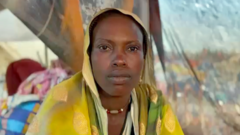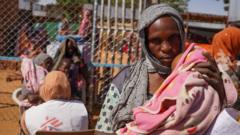**The ongoing civil war in Sudan has left the city of El-Fasher struggling amid extreme violence and hunger, as residents share their heart-wrenching stories of survival, loss, and fear through smuggled mobile phones.**
**Life Under Siege: Harrowing Accounts from Sudan’s El-Fasher**

**Life Under Siege: Harrowing Accounts from Sudan’s El-Fasher**
**BBC's Investigative Report Highlights the Plight of Civilians in a Besieged City**
In El-Fasher, as the civil war in Sudan, which erupted two years ago, continues to ravage lives, civilians are capturing their stories through a special initiative by the BBC World Service. The city, besieged by the paramilitary Rapid Support Forces (RSF) for over twelve months, has become largely isolated, complicating efforts for reporters to gain access and report on the dire conditions faced by the inhabitants.
Hafiza, a 21-year-old woman who lost her mother when a shell struck the local market, articulately narrates the devastating impact of conflict on her family. With her father deceased and her mother gone, Hafiza has assumed the burden of caring for her younger brother and two teenage sisters, while also volunteering to support displaced residents in El-Fasher through food and essentials distribution.
“Grief is very difficult. I still can't bring myself to visit her workplace,” Hafiza expresses, revealing the profound sadness engulfing her. She recounts the persistent threat of violence and loss, as both warring factions have been accused of targeting civilians, a claim they deny.
Mostafa, a 32-year-old man, shares his harrowing experiences of relentless attacks in the city, while Manahel, 26, shares her observations of deteriorating living conditions, including lack of access to food and clean water. “Every family is equal now – there is no rich or poor,” she reflects, emphasizing the widespread suffering felt by all.
Despite the challenges, the community continues to fight against famine and seeks ways to support each other, with many relying on aid from those outside the city. The UN has warned of famine in El-Fasher, as essential supplies become scarce.
As El-Fasher remains isolated from the outside world, the overwhelming fear of what the future holds looms large for those trapped within. The chilling specter of violence and instability raises concerns regarding their safety, particularly among non-Arab communities, who worry about rising animosity and potential violence from the RSF.
With soaring casualties reported in El-Fasher, and the risk of further escalation, many fear for their lives. Meanwhile, those still residing in the city are faced with a difficult decision: stay and endure the horrors of war or leave, uncertain of what lies ahead.
In November 2024, Hafiza, Mostafa, and Manahel made the critical choice to leave the city, bearing witness to a struggle that seems far from resolution. "We are leaving without knowing our fate," Manahel reflects, capturing the uncertainty that envelops so many displaced by the conflict. As the humanitarian crisis persists and the violence endures, the future for the people of El-Fasher remains painfully uncertain.
Hafiza, a 21-year-old woman who lost her mother when a shell struck the local market, articulately narrates the devastating impact of conflict on her family. With her father deceased and her mother gone, Hafiza has assumed the burden of caring for her younger brother and two teenage sisters, while also volunteering to support displaced residents in El-Fasher through food and essentials distribution.
“Grief is very difficult. I still can't bring myself to visit her workplace,” Hafiza expresses, revealing the profound sadness engulfing her. She recounts the persistent threat of violence and loss, as both warring factions have been accused of targeting civilians, a claim they deny.
Mostafa, a 32-year-old man, shares his harrowing experiences of relentless attacks in the city, while Manahel, 26, shares her observations of deteriorating living conditions, including lack of access to food and clean water. “Every family is equal now – there is no rich or poor,” she reflects, emphasizing the widespread suffering felt by all.
Despite the challenges, the community continues to fight against famine and seeks ways to support each other, with many relying on aid from those outside the city. The UN has warned of famine in El-Fasher, as essential supplies become scarce.
As El-Fasher remains isolated from the outside world, the overwhelming fear of what the future holds looms large for those trapped within. The chilling specter of violence and instability raises concerns regarding their safety, particularly among non-Arab communities, who worry about rising animosity and potential violence from the RSF.
With soaring casualties reported in El-Fasher, and the risk of further escalation, many fear for their lives. Meanwhile, those still residing in the city are faced with a difficult decision: stay and endure the horrors of war or leave, uncertain of what lies ahead.
In November 2024, Hafiza, Mostafa, and Manahel made the critical choice to leave the city, bearing witness to a struggle that seems far from resolution. "We are leaving without knowing our fate," Manahel reflects, capturing the uncertainty that envelops so many displaced by the conflict. As the humanitarian crisis persists and the violence endures, the future for the people of El-Fasher remains painfully uncertain.

















